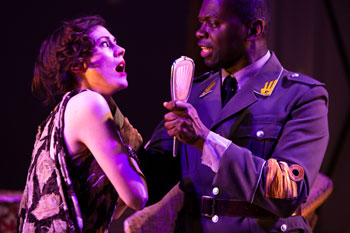April 20, 2009
The legendary story telling powers of Creation Theatre Company are such that 3 hours of Othello (including an interval) passes by in a flicker. Set around World War 2, this seductive yet sexually suppressed era works well to frame the premise of a young Desdemona marrying a strong foreign soldier against the ideologies of her Senator father. Energy is given to battle scenes by Aidan Treays’ pageant designs and the cast moves well as an ensemble to boldly bleak music. The period vocal duets between Desdemona and her maid Emilia are smoking. The New Road Baptist Church has the snug fit of underground war rooms. The ever present modern crucifix illuminates just how far off the path of good the characters are marching on Nancy Surman’s functionally spartan stage design. Audience members look directly down or squarely on at the action and quite rightly are forced into the mode of judgement as Iago unleashes destructive jealousy. The key scene to the play where Iago is adjusting the uniform of Othello, his superior officer, is effortlessly tucked into the subconscious as Iago transforms Othello from a doting lover to a doubting husband. The resulting violent scenes are all too vivid and brutally executed to bring about a satisfying and climactic ending.
Charlotte Conquest directs this play with vitality offering new ideas to engage Othello experts and an entertaining show for newcomers to the text. Othello plays the General of war in a dominant, dogmatic style, which works as a good base for his darker side to be later translated into violence. This uncompromising man sees people as friend or foe. Desdemona convinces the audience throughout of her love for Othello, disturbingly so in her final scenes where she instructs her bed to made with sheets she would have as a shroud. Iago offers an intoxicating mix of delivery styles including mildly camp, slightly sinister and mentally twisted as he treads the fine line between cracked genius and amiable lunatic. In Iago’s deceptively light delivery his personal inadequacies have an almost sexual intensity as his jealousy of Othello becomes increasingly outrageous. Ashley Bale’s lighting design makes no mistake where the root of evil is lurking. Ethereal ice-cold blue shades the face of Iago as he reveals the depth of his jealousy to the audience. The passage of time flows easily through the plot thanks to Shakespeare’s nod to nature, where an instant golden glow to the stage and birdsong evokes morning. Jacky Sadones and the front of house team extend the warmest of welcomes for this chilling production.
Charlotte Conquest directs this play with vitality offering new ideas to engage Othello experts and an entertaining show for newcomers to the text. Othello plays the General of war in a dominant, dogmatic style, which works as a good base for his darker side to be later translated into violence. This uncompromising man sees people as friend or foe. Desdemona convinces the audience throughout of her love for Othello, disturbingly so in her final scenes where she instructs her bed to made with sheets she would have as a shroud. Iago offers an intoxicating mix of delivery styles including mildly camp, slightly sinister and mentally twisted as he treads the fine line between cracked genius and amiable lunatic. In Iago’s deceptively light delivery his personal inadequacies have an almost sexual intensity as his jealousy of Othello becomes increasingly outrageous. Ashley Bale’s lighting design makes no mistake where the root of evil is lurking. Ethereal ice-cold blue shades the face of Iago as he reveals the depth of his jealousy to the audience. The passage of time flows easily through the plot thanks to Shakespeare’s nod to nature, where an instant golden glow to the stage and birdsong evokes morning. Jacky Sadones and the front of house team extend the warmest of welcomes for this chilling production.




